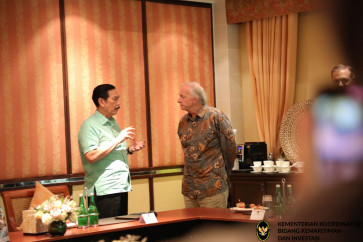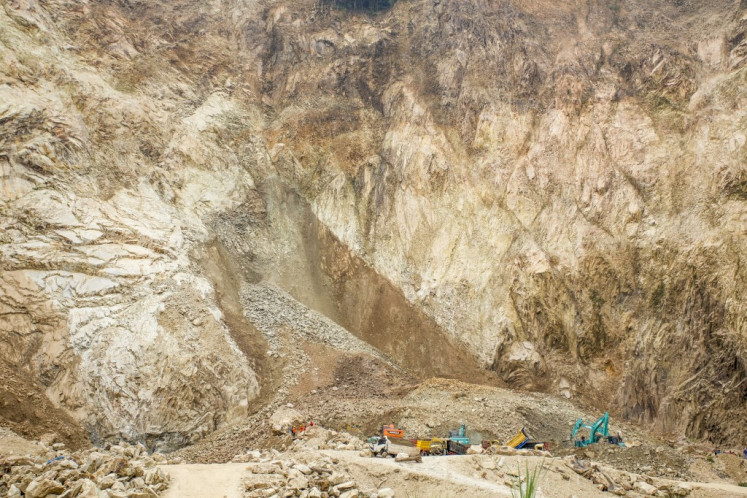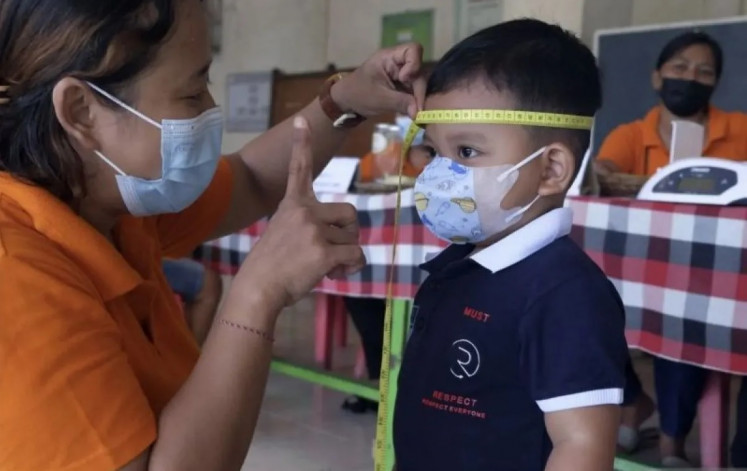World Bank chief praises RI economy
Good reading: World Bank president Jim Yong-kim (left), accompanied by President Joko “Jokowi” Widodo, hands out books to residents of Tangkil village, Bogor regency, West Java, on Wednesday
Change text size
Gift Premium Articles
to Anyone

G
ood reading: World Bank president Jim Yong-kim (left), accompanied by President Joko “Jokowi” Widodo, hands out books to residents of Tangkil village, Bogor regency, West Java, on Wednesday. The visit was part of the government’s campaign against stunting. (Antara /Puspa Perwitasari)
World Bank president Jim Yong-kim lauded Indonesia’s economy on Wednesday, saying its macroeconomic indicators were better than other developing countries, while calling for the government to be cautious in the face of a potential trade war.
During a courtesy call with President joko “Jokowi” Widodo at the Bogor Palace, West Java, Kim praised the government’s debt management citing Indonesia’s relatively low debt-to-gross domestic product (GDP) ratio compared with other developing countries.
“We feel that Indonesia’s economy and the [government’s] management of the economy are among the models for the entire world,” he said while visiting a village in Bogor with Jokowi on Wednesday.
Indonesia posted an average government debt-to-GDP ratio of 26.5 percent from 2014 to 2016, while regional peers Thailand and Malaysia posted 42.3 percent and 53.3 percent, respectively, according to Spain-based economic think tank FocusEconomics data.
In 2019, Indonesia’s average government debt-to-GDP ratio is expected to reach 28.9 percent, while Thailand and Malaysia will be at 43.3 percent and 50.9 percent, the data show.
After the commodity boom ended a few years ago, surges in debt have burdened many countries that rely heavily on commodities, such as Venezuela.
As trade spats have escalated globally, particularly those between the United States and China, Kim warned the Indonesian government to anticipate negative impacts as trade growth could be disrupted.
“We are advising all interested parties that nobody ever wins in a trade war and so we are hoping for the best. But Indonesia, just like any other economy, has to be prepared,” he said.
As a trade war loomed over global markets, Taye Shim, research head of Mirae Asset Sekuritas Indonesia, said the government could anticipate weaker export growth by boosting its spending. However, the spending needed to be within the limits of state revenues.
“The government is trying to minimize the negative effect of the external side [net exports] by pushing the domestic side [consumer and public spending]. However, based on previous experience, consumer spending is stagnant and state spending is slow,” he said recently.

Mirae Asset Sekuritas Indonesia has revised down its economic growth projection to 5.2 percent in 2018 and 5.3 percent in 2019 from the previous 5.3 percent and 5.5 percent, respectively.
Southeast Asia’s largest economy saw its GDP grow by 5.06 percent year-on-year in the first quarter of this year, slightly higher than the 5.01 percent and 4.94 percent booked in the corresponding periods of 2017 and 2016.
The World Bank and the International Monetary Fund (IMF) will hold their annual meetings in Bali in October, which the government has said are expected to produce strategic results to help the global economy and benefit Indonesia in the long run.
Kim expressed a similar view that the upcoming meetings in Bali would have a positive impact on Indonesia’s economy while also bringing about a “win-win” output for the global community.
Indonesia beat eight other applicants for the IMF’s tender four years ago as Bali was deemed ready to host the conferences, which are expected to be attended by about 17,000 participants from across the globe.
During the courtesy call on Wednesday, Jokowi brought Kim on a site visit to Tangkil village in Bogor to see the progress of the stunting-reduction campaign in Indonesia.
On June 22, the World Bank approved a US$650 million loan for Indonesia to fight stunting and build a modern irrigation system. The loan portion for stunting is $400 million and is aimed at increasing pregnant women’s access to health services, nutrition, education and sanitation.
According to World Health Organization (WHO) data, Indonesia’s prevalence of stunting stood at 36.4 percent of the total children under the age of 5 years in 2013, placing the country in the top-five countries in the world for stunting.









